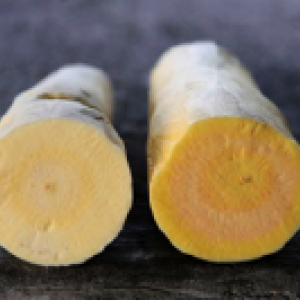
Cassava is a "survivor" crop, able to thrive in the expected higher temperatures caused by climate change. An alliance of scientists has recently been formed to help promote cassava cultivation. The 300 scientists attending the second International Scientific Conference of the Global Cassava Partnership for the 21st Century, held in Kampala Uganda presented a new initiative called Global Cassava Modelling Consortium. The Consortium aims to help researchers share information on this increasingly important crop, to better understand the physiology of the plant and to explore avenues for protecting it from attacks.
The researchers showed how the tuber becomes even more productive in hotter temperatures and outperformed potatoes, maize, beans, bananas, millet and sorghum - some of Africa's main food crops. With cassava being the second most important source of carbohydrates in sub-Saharan African after maize its importance for food security was highlighted by researchers at the conference. They described how East Africa could increase the cassava production up to 10 percent if temperatures rise as predicted. Likewise production is likely to grow in Western Africa with a slightly smaller increase in production in Southern Africa.
Despite being very resilient in the face of climate change the cassava crop has difficulties coping with threats from diseases related to global warming like mealy bug, cassava brown-streak disease and cassava mosaic disease. Andy Jarvis, a climate change scientist at the International Centre for Tropical Agriculture (CIAT) and CGIAR’s Climate Change, Agriculture and Food Security (CCAFS) Research Programme says that more research is needed: “now we have to act promptly on the research, as more pests and diseases are manifesting themselves because of climate change."
The cassava plant has been praised for its potential not only as a food crop but also for industrial starch, used in more than 300 industrial products. Uganda's Minister of State for Agriculture Zerubabel Mijumbi Nyiira said "…fermented cassava starch can produce ethanol used in bio-fuel. But more importantly, its survival in circumstances of this nature makes it one of the most important crops that can make Africa food secure."
To read the paper Is Cassava the Answer to African Climate Change Adaptation? by Andy Jarvis et al in Tropical Plant Biology, click here.
To read the article from IRIN UN Office for the coordination of humanitarian affairs, click here.
And for more on the Global Cassava Modelling Consortium by CIAT, click here.
For more on this topic see our Research Library entries on food security and biofuels.
Although cassava is a resilient crop and a major source of carbohydrates, its nutritional quality in other respects is poor. The Harvest Plus programme is seeking to improve its nutritional profile through breeding efforts to enhance its Vitamin A content, read more on this here.
If you have any thoughts on biofortification approaches to addressing malnutrition, or if you are working in this field, pleased to send your comments through here.







Post a new comment »